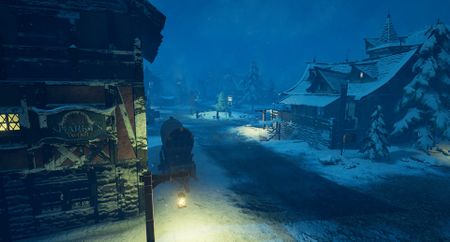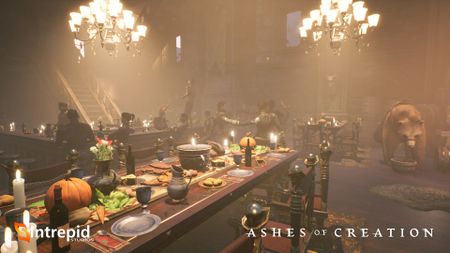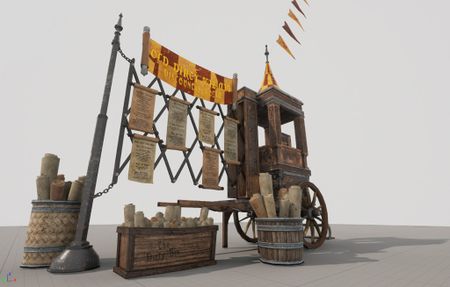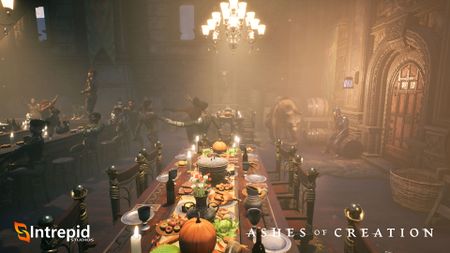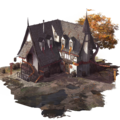Tavernen
Read more...Inns and taverns dot the rural lands of Verra, and serve as crucial waypoints between destinations. However, one tavern has a unique patron that not many would expect. A man by the name of Fent is the owner of the quaint establishment, and upon entering, patrons may notice a large furry mass in the corner. Closer inspection reveals it to be no less than a fully grown bear, complete with his own bear sized flagon of mead.[2]
Tavernen sind eine Art von Gebäude, welche in Nodes oder auf Grundbesitz platziert werden können.[4]
- Die Anzahl der Tavernen, die von der Regierung der Node gebaut werden können, ist begrenzt.[5]
Viele Abenteuer beginnen in einer bescheidenen Taverne. Ich bin sicher, viele von euch haben Erinnerungen an Pen-&-Paper-Abenteuer, die in einer kleinen Stadt begannen, mit einer Kleinstadt-Taverne und Kleinstadt-Problemen. Mit der Zeit wird es zu einem Hauptquartier. Du gehst dorthin um dich auszuruhen, um zu essen, um den neusten Tratsch zu hören, und um Freunde zu treffen. Es ist ein Zuhause - weit weg von der Heimat - und deine Verbindung zu der Welt, wenn du gerade nicht auf einer Quest bist.[4]
Tavern progression
Je länger eine Taverne in Betrieb ist und je mehr Gäste bedient werden, desto schneller steigt eine Taverne auf.[6][7]
- Q: Welche Vorteile erhalten Spieler, wenn sie die Rolle eines Tavernenbesitzers übernehmen?
- A: Sie werden mit den Kreationen auffallen, weil dies den Charakteren angezeigt wird, die diese Dinge konsumieren. Darüber hinaus können sie abhängig von der Anzahl der Kunden, die bedient werden, bestimmte Arten von Einzelpostenprämien erhalten. Sie können auch wirtschaftliche Belohnungen erhalten, beispielsweise Gold aus dem Gasthaus, in dem die Waren verkauft werden. Und dann können bestimmte Arten von Rezepten und/oder Anbietern freischaltet werden, basierend auf der Reputationsstufe, die in dieser bestimmten Node aufgebaut wurde[6] – Steven Sharif
- Tavernen verfügen über Technologiebäume die es dem Tavernenbesitzer ermöglichen, bestimmte Boni und Dienstleistungen des Unternehmens zu spezialisieren und zu verbessern. [8][7]
- Möglicherweise gibt es Aufträge die nur in Tavernen im Besitz des Spielers gesammelt werden können.[7]
Entwicklung des Grundbesitzes
Durch denEntwicklung des Grundbesitzes werden neue Boni, Fähigkeiten und Möglichkeiten für freeholds freigeschaltet.[9]
- Gebäude auf dem Grundbesitz können je nach Nutzungsdauer und Produktivität des Eigentums aufgewertet werden. [9]
- Wir möchten, dass es in vielen Systemen einen Fortschritt gibt, und ein Teil des Freehold-Fortschritts besteht darin, dass, wenn ihr diese Basisgebäude errichtet, je länger und produktiver ihr mit diesem Freehold seid und mit diesem Freehold existiert, desto mehr Möglichkeiten haben, diese Gebäude aufzusteigen und Neues anzubieten Boni, neue Fähigkeiten, neue Fähigkeiten; Und schon allein das Überleben in dieser Welt ist eine Leistung für sich, daher wird sie dadurch belohnt, dass man Fortschritte in diesen Dingen ermöglicht.[9] – Steven Sharif
Tavern consumables
Players will be able to buy food and drink from a Tavern, some of which will be supplied by the tavern owner or other patrons that they get their menu from. These consumables will offer tangible benefits to players that stay within a certain proximity of the tavern itself.[10][11][12][4]
If a player chooses to construct a tavern or a business on their freehold, they can offer food through that tavern and players who are visiting the area doing hunting quests can visit the tavern, eat food if it's available, and they will receive a buff that is proximity based essentially if they hunt around that person's business... Additionally that business can be upgraded through the access of additional blueprints as well as resources that need to be then poured into the building; and if they do so that proximity radius expands.[11] – Steven Sharif
Characters will have some agency over what consumables are available in taverns.[10][11] This could be tied to supply quests or available resources within the region.[13]
Characters will have a defined region of agency over what is available in the different taverns, whether they be taverns located within the city or taverns located on a freehold; and those could be tied to supply quests that are then done by the players. They could also be regionally determined by availability of resources.[14] – Steven Sharif
If you're a tavern over on the western side you might have different grains, spices and mead there; and over on the other side of the world there might be taverns with completely different things.[14] – Jeffrey Bard
Tavernen-NPCs
Tavernen von Spielern auf Grundbesitz können NPC-Barkeeper einsetzen, um Drinks zu verteilen, die für diese Taverne hergestellt wurden.[12]
Kommunikation in Tavernen
Tavernen bieten einen privaten Chat und Sprachkommunikation für alle Personen innerhalb des Gebäudes.[4]
Chat bubbles
Chat-Blasen können von den Spielern ein- oder ausgeschaltet werden. Es wird Optionen zum Verwalten der Blasen geben, um die visuelle Unordnung zu reduzieren. [15][16]
Wir möchten Chat-Blasen einbinden. Wir möchten eine Vielzahl von Optionen hinzufügen, mit denen ihr diese Blasen verwalten könnt, damit ihr sie einschalten könnt und nicht nur ein Blasenfeld seht.[16] – Jeffrey Bard
Tavernen-Musik
Musik in Tavernen kann von Spielern ausgewählt werden.[4]
Räume der Taverne
Besitzer von Tavernen können Räume vermieten. Die Anzahl und Qualität der Räume wird von dem Level der Taverne festgelegt.[4]
Gesellschaftsspiele
Gesellschaftsspiele (Taverenspiele) die in von Spielern gebauten Tavernen oder In -Node- Tavernen gespielt werden. [17]. Einige werden Würfelspiele sein, andere Kartenspiele; und einige werden weniger wohlschmeckend sein.[18]
- Die Idee hinter den Tavernenspielen ist es, eine weitere soziale Schnittstelle zu schaffen. Dies ist der Ort, an dem Spieler, die den RP-Aspekt von MMORPGS lieben, in eine Taverne gehen und neue Leute treffen und Spiele spielen möchten.[19] – Steven Sharif
- Diese Spiele beinhalten sowohl Glücks- als auch Geschicklichkeitsaspekte.[18]
- Sie müssen von 2 oder mehr Personen gespielt werden. [18]
- Spieler können Spielwährung gegen andere Spieler wetten. [18]
- Die Entwickler erwägen eine Zweitwährung für Tavernenspiele, die den Kauf von Kosmetikartikeln über einen Zweitwährungsmarkt ermöglichen würde. [19]
- Es kann ein Rankingsystem geben, das dazu beiträgt, diese Währung basierend auf der Platzierung im Ranking zu erhalten. [19]
- Die Alternative ist die Verwendung der regulären Währung (Gold).[19]
- Ein Teil der Einnahmen aus dem Spiel geht an den Tavernenbesitzer oder Node.[17][18]
- Gesellschaftsspiele variieren basierend auf der vorherrschenden Rasse einer Node.[19][18][20]
- Es kann einzigartige Spiele geben, die durch Abenteuer in der Welt erworben werden können. [19]
- Tavernenbesitzer diktieren die Tischkosten für Gesellschaftsspiele. Der Bürgermeister der Node bestimmt den Steuersatz, der beim Geldwechsel gilt. [21][22]
- Wenn ein Spieler an einem Spiel teilnehmen möchte, kann er sich an einen Tisch setzen, und ein anderer Spieler kann sich zu ihm setzen. An diesem Punkt wird die Gameplay-Ebene für das Minispiel in einem Fenster der Benutzeroberfläche geöffnet. Je nach Spielart. [22] – Steven Sharif
Gesellschaftsspiele waren ein Kickstarter Stretchgoal.[23]
Anschlagbretter
Anschlagbretter are available within nodes[25] and player taverns.[4]
- A market UI lists the current items available for sale in the node and in the same economic region.[26][27]
- This includes items for sale in player stalls and auction houses.[28]
- Players can't purchase directly from the market UI. Instead it gives the location of player stalls where the items may be purchased.[29]
- Encourage localized grouping.[4]
- Enable posting of jobs.[25]
- Sponsoring von Quests.[30]
Tavern security
- There are plenty of mechanics for you to exercise your dislike of another player especially through PvP and we don't want to hard code in divisive systems, such as either excluding movement of a player character into a certain area, such as your Tavern; or banning somebody through that method.[32] – Steven Sharif
Freehold security
Freehold owners are able to set permissions that grant access to their artisan and business buildings' services.[33][34][35][36][37]
- Freehold ownership is designated by one account only and then the family system is the system that facilitates multiple accounts having permission basis within that freehold.[38] – Steven Sharif
- Freehold permissions are intended to work with the family and guild systems.[33][34][35]
- It is still not determined if freehold permissions will be able to be granted to individuals outside those social structures.[34]
- Freehold permissions may only apply to battalions/micro-structures within a guild.[39]
- Interaction with the guild system will be tested in Alpha-2.[40]
- This includes permission to enter the homestead, interact with furniture, access storage, interact with crafting or processing stations, and harvest resources.[33]
- Permissions to help manage your home are handled through affiliations like your Guild and family system. When setting permissions for your Freehold to do things like enter the house, interact with furniture, access Freehold storage, interact with crafting and processing stations, and harvesting gatherables on a Freehold, you can set if your Guild or family members should be able to do these things.[33]
- Permission to decorate a freehold is restricted to the owner of the freehold.[41] Previously it was stated that permission to decorate but not take anything from the house would be able to be assigned to other players.[42]
- Family members may be granted permission to apply their cosmetic skins to freehold buildings.[43]
Players cannot steal from a freehold under normal circumstances.[33][44][45][46]
- Items stored in a freehold become lootable after a successful siege against their parent node.[47][33][46] It has not been decided which players get to loot the debris field during this period.[47]
- Only players given permission to do so will be able to do things like access your Freehold storage, and harvest crops and animals on your Freehold. These permissions are capable of being individually assigned per interaction. Note that if the node associated with your Freehold is successfully destroyed during a siege event, attackers will be able to assault Freeholds, and have a chance to pillage them for their resources.[33]
Players cannot PvP while inside the footprint of a freehold homestead even if the doors are unlocked.[33][48] This does not apply for a period of two hours following a successful siege against its parent node.[49][50][51][52]
- Your home building is safe from PvP. While on the footprint of your home, you can not be harmed by damage from other players.[33]
- NPC-Wachen may be available for hire to defend freeholds after a successful node siege.[52] NPC guards that permanently exist on a freehold are not a planned feature.[53]
- Duelle may be initiated within a freehold or node as they are considered self-contained events that are opt-in by all parties, and do not fall under the player flagging system.[54]
Rested experience
Tavernen offer rested experience (rested XP) for those who rent rooms or spend time as patrons of the tavern.[8][4]
- Rested experience allows players to gain experience at a faster rate for a period of time.[4]
- There are no current plans to replace rested experience with another bonus for max-level players.[55]
- Rested experience increases the rate that experience debt is paid back.[56]
Kopfgeldjäger-Karten
Spieler mit genügend Verderbnispunkten sind auf der Weltkarte und auf Mini-Karten sichtbar. Diese Spieler haben eine eigene Markierung auf der Weltkarte, die von einem NPC eines Militärknotenpunktes von mindestens der Stufe 4 (Stadt),und wird nur an jene Spieler verteilt, die den Kopfgeldjäger Titel besitzen.[57] Die Genauigkeit von Kopfgeldjägerkarten wird vom Fortschritt eines Spielers im Kopfgeldjägersystem bestimmt.[58]
Tavernen sind Orte, an denen Kopfgelder ausgehängt werden. Gewinnen Spieler viele Verderbnispunkte, kann es sein, dass Tavernen ein Kopfgeld auf diese Spieler aushängen. Oder sie verlangen, dass ein spezifisches Gebiet von Problem-Spielern gereinigt wird. Dies lässt einen Indikator auf der Weltkarte erscheinen.[4]
Bounty hunter Pathfinding ability
| Skill | Icon | Origin | Description |
|---|---|---|---|
| Pfadfinder | Bounty hunter | Reveals corrupted player locations on the bounty hunter's map.[59][60] Activating this ability will flag the bounty hunter for combat only to corrupted players for a period of one hour from the time of activation.[59] The pathfinding ability can be toggled on or off.[59][61] |
Tavern lore
Fent's Tavern
Inns and taverns dot the rural lands of Verra, and serve as crucial waypoints between destinations. However, one tavern has a unique patron that not many would expect. A man by the name of Fent is the owner of the quaint establishment, and upon entering, patrons may notice a large furry mass in the corner. Closer inspection reveals it to be no less than a fully grown bear, complete with his own bear sized flagon of mead. Fent and the beast harbor a strong kinship, and on a particularly raucous night, the two will even have a good wrestle on the tavern floor. Many have pressed Fent for the tale of his unlikely companion, and although it is one he is willing to tell, there's always a solemn gleam in his eyes when he tells it.[2]
Years ago, when Fent was still a young hunter, he was out during a particularly harsh blizzard. Every tree in the forest looked like the others, but as luck would have it, he stumbled upon a cave. Fent managed to get a fire going and intended to stay until the torrent outside ceased. While waiting, he fell asleep, but was startled awake when he heard something slowly creeping through the cave towards him. He quickly bounded up from the floor. A bear from deep within the cavern had wandered close to the entrance, and despite his fear, Fent slowly began to reach for his knife. The cave reverberated with the bear's roar as it charged. It knocked Fent down, but not before he managed to jam the blade deep into its neck. Fent kept blindly stabbing even as he was being mauled, kicking and gnashing against the beast. The bear struggled, then finally stopped. Fent laid there for what seemed like forever, straining to catch his breath. Eventually, he gathered to his feet with a wince. Amidst his senses, he began to hear a faint whimpering. A wayward cub had wandered its way to the grim scene. It mewled after its mother, yet there was no reply. Guilt welled up in Fent's body, even as his body wracked with pain. Feeling responsible for this young cub, he placed it next to him alongside the fire, and tried to nurse his wounds as best he could. After visibility had improved, he took the cub onto his shoulder, and slowly made his way back to his home.[2]
The cub proved to be troublesome to care for at first. He was almost always hungry, and Fent awoke several times in the middle of the night to the telltale clattering of the larder being raided. Fent deemed that the cub needed a dwelling of his own, and decided to place the beast within the shed. The cub would still mewl, despite the warmth of its new home. Although hunting, was Fent's primary vocation, he had a knack for brewing in his spare time. Fent decided to use some local honey as the base of his new brew. A concoction sure to quickly allow the bear to slip into the realm of sleep. After all, bears love honey. Months of experimentation had yielded a potent mead that, though quite a quantity was required, certainly put the bear out. Despite the circumstances, the bear looked to Fent as his caretaker, and the two began to trust each other. The beast had taken an unexpectedly great liking to Fent's mead, and in honor of his discovery, named his friend Mug.[2]
Years later, after deciding that brewing and running a tavern would be far safer than being a hunter, Fent opened his own. Mug is surprisingly capable in helping around the tavern, and after a hard days work, loves to relax on the floor with a large flagon of mead; usually alongside other equally relaxed floorborne patrons.[2]
The Mighty Beard
You arrive in a town called Marrow’s Mead, and before long you find yourself in a tavern called The Mighty Beard. You see some fellow travelers, and the rag-tag band happen to sit at your table. The table is old and worn, water damage certainly from spilled beer. The tavern is lively, a barmaid seems to dance between tables as she holds pint glasses by the dozen. A rosy cheeked dwarf slams her ale down and challenges a behemoth of a Ren’kai to an arm wrestling match. Music walks its way to your ear, and begins to run as the Elf increases tempo. You feel at home, and your could-be companions at the table begin speaking.[4]
Schlachtkarten
Schlachtkarten allow players to strategize, gain bonuses on planned attacks, and see the blueprints of attackable points. Whether attacking a node or castle, players will be able to discern defenses, analyze possible weak points and gain tactical advantages before the battle begins.[4]
- Battle maps might not fit into lower level or smaller sized taverns.
- Battle maps are not currently on the official roadmap for launch.[62]
Bildmaterial
Siehe auch
Einzelnachweise
- ↑ Video, 2019-09-26 (0:0).
- ↑ 2.0 2.1 2.2 2.3 2.4 2.5 2.6 2019-11-26 Blog: Bear the Burden
- ↑ A reactive world - Nodes.
- ↑ 4.00 4.01 4.02 4.03 4.04 4.05 4.06 4.07 4.08 4.09 4.10 4.11 4.12 The mighty beard!
- ↑ Liveübertragung, 2018-01-18 (38:17).
- ↑ 6.0 6.1 Liveübertragung, 2022-12-02 (1:22:30).
- ↑ 7.0 7.1 7.2 Podcast, 2018-04-23 (29:56).
- ↑ 8.0 8.1 Liveübertragung, 2023-06-30 (27:52).
- ↑ 9.0 9.1 9.2 Podcast, 2018-05-11 (48:29).
- ↑ 10.0 10.1 Liveübertragung, 2021-01-29 (1:11:29).
- ↑ 11.0 11.1 11.2 11.3 Liveübertragung, 2020-07-25 (1:01:07).
- ↑ 12.0 12.1 Liveübertragung, 2018-06-04 (14:13).
- ↑ Liveübertragung, 2018-01-18 (27:33).
- ↑ 14.0 14.1 Liveübertragung, 2018-01-18 (27:31).
- ↑ Interview, 2021-02-07 (55:22).
- ↑ 16.0 16.1 Liveübertragung, 2021-01-29 (1:20:05).
- ↑ 17.0 17.1

- ↑ 18.0 18.1 18.2 18.3 18.4 18.5
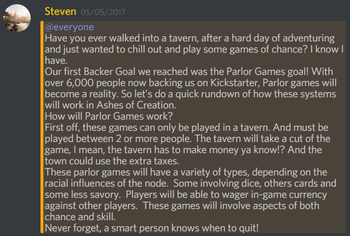
- ↑ 19.0 19.1 19.2 19.3 19.4 19.5 Interview, 2021-06-13 (18:40).
- ↑ Liveübertragung, 2017-05-24 (11:04).
- ↑

- ↑ 22.0 22.1

- ↑

- ↑ Liveübertragung, 2017-05-19 (33:57).
- ↑ 25.0 25.1 Liveübertragung, 2017-10-31 (28:58).
- ↑ Liveübertragung, 2017-05-12 (53:08).
- ↑ Liveübertragung, 2017-05-10 (35:16).
- ↑ Liveübertragung, 2020-07-31 (1:34:06).
- ↑ Liveübertragung, 2017-05-10 (16:37).
- ↑ Liveübertragung, 2017-10-31 (30:34).
- ↑ Interview, 2023-07-09 (54:22).
- ↑ 32.0 32.1 Podcast, 2018-04-23 (46:10).
- ↑ 33.0 33.1 33.2 33.3 33.4 33.5 33.6 33.7 33.8 Blog: Exploring the Boundless Opportunities of Freeholds.
- ↑ 34.0 34.1 34.2 Interview, 2023-07-09 (53:08).
- ↑ 35.0 35.1 Liveübertragung, 2023-06-30 (26:23).
- ↑ Interview, 2018-05-11 (28:21).
- ↑ Development Update with Freehold Preview.
- ↑ Liveübertragung, 2023-06-30 (1:24:16).
- ↑

- ↑

- ↑ Liveübertragung, 2021-04-30 (1:12:33).
- ↑ Liveübertragung, 2020-06-26 (51:58).
- ↑ Liveübertragung, 2023-06-30 (1:15:34).
- ↑

- ↑ Liveübertragung, 2023-06-30 (1:19:01).
- ↑ 46.0 46.1 Liveübertragung, 2017-05-17 (1:03:23).
- ↑ 47.0 47.1 Liveübertragung, 2023-07-28 (1:26:16).
- ↑ Liveübertragung, 2023-06-30 (1:49:00).
- ↑ Liveübertragung, 2021-11-19 (54:26).
- ↑ Liveübertragung, 2020-08-28 (2:04:00).
- ↑ Blog - Know Your Nodes - Advance and Destroy.
- ↑ 52.0 52.1 Liveübertragung, 2017-05-19 (28:04).
- ↑ Liveübertragung, 2018-01-18 (31:05).
- ↑ Liveübertragung, 2021-12-23 (1:29:27).
- ↑ Liveübertragung, 2023-06-30 (1:22:32).
- ↑ Liveübertragung, 2023-09-29 (1:18:04).
- ↑ Interview, 2017-01-20 (06:12).
- ↑ Liveübertragung, 2017-05-24 (48:00).
- ↑ 59.0 59.1 59.2

- ↑ Interview, 2017-04-27 (9:28).
- ↑
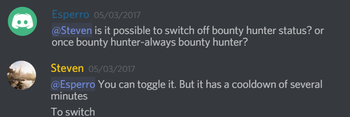
- ↑ Liveübertragung, 2017-10-31 (33:28).
